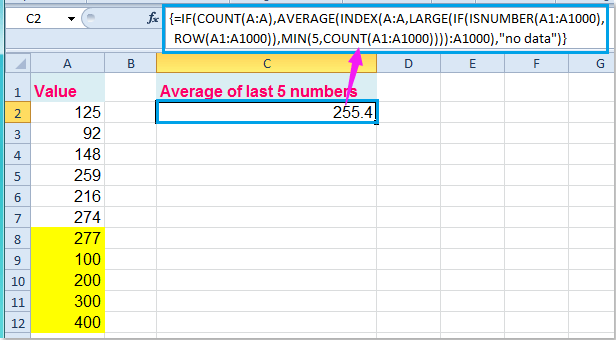How to average last 5 values of a column as new numbers entering?
In Excel, you can quickly calculate the average of last 5 values in a column with the Average function, but, from time to time, you need to enter new numbers behind your original data, and you want the average result will be changed automatically as the new data entering. That is to say, you would like to have the average always reflect the last 5 numbers of your data list, even when you add numbers now and then.
Average last 5 values of a column as new numbers entering with formulas
 Average last 5 values of a column as new numbers entering with formulas
Average last 5 values of a column as new numbers entering with formulas
The following array formulas may help you to solve this problem, please do as follows:
Enter this formula into a blank cell:
=IF(COUNT(A:A),AVERAGE(INDEX(A:A,LARGE(IF(ISNUMBER(A1:A10000),ROW(A1:A10000)),MIN(5,COUNT(A1:A10000)))):A10000),"no data") (A:A is the column which contains the data you used, A1:A10000 is a dynamic range, you can expand it as long as your need, and the number 5 indicates the last n value.), and then press Ctrl + Shift + Enter keys together to get the average of last 5 numbers. See screenshot:

Now, when you input new numbers behind the original data, the average will update accordingly. See the screenshot:

Note: If the column of cells contain 0 values, you want to exclude the 0 values from your last 5 numbers, the above formula will not work, here, I can introduce you another array formula to get the average of last 5 non-zero values, please enter this formula:
=AVERAGE(SUBTOTAL(9,OFFSET(A1:A10000,LARGE(IF(A1:A10000>0,ROW(A1:A10000)-MIN(ROW(A1:A10000))),ROW(INDIRECT("1:5"))),0,1))), and then press Ctrl + Shift + Enter keys to get the result you need, see screenshot:

Related articles:
How to average every 5 rows or columns in Excel?
How to average top or bottom 3 values in Excel?
Best Office Productivity Tools
Supercharge Your Excel Skills with Kutools for Excel, and Experience Efficiency Like Never Before. Kutools for Excel Offers Over 300 Advanced Features to Boost Productivity and Save Time. Click Here to Get The Feature You Need The Most...
Office Tab Brings Tabbed interface to Office, and Make Your Work Much Easier
- Enable tabbed editing and reading in Word, Excel, PowerPoint, Publisher, Access, Visio and Project.
- Open and create multiple documents in new tabs of the same window, rather than in new windows.
- Increases your productivity by 50%, and reduces hundreds of mouse clicks for you every day!
All Kutools add-ins. One installer
Kutools for Office suite bundles add-ins for Excel, Word, Outlook & PowerPoint plus Office Tab Pro, which is ideal for teams working across Office apps.
- All-in-one suite — Excel, Word, Outlook & PowerPoint add-ins + Office Tab Pro
- One installer, one license — set up in minutes (MSI-ready)
- Works better together — streamlined productivity across Office apps
- 30-day full-featured trial — no registration, no credit card
- Best value — save vs buying individual add-in